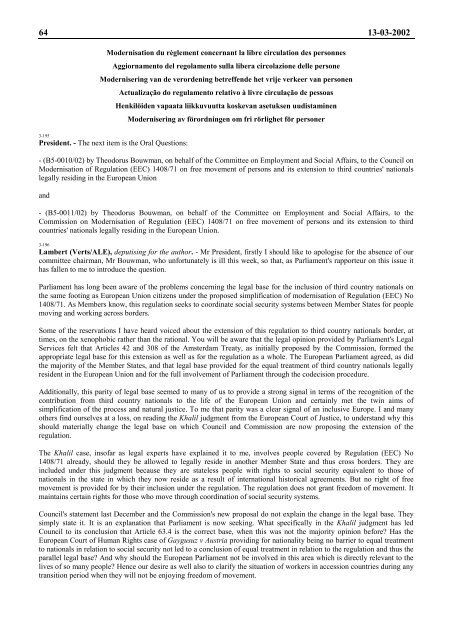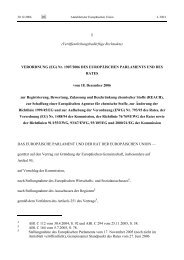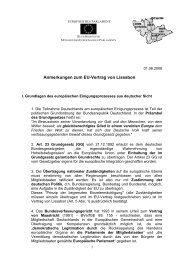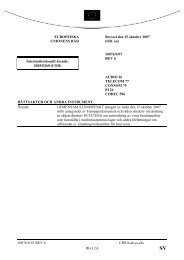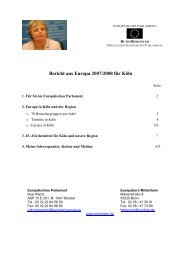mødet onsdag i den 13. marts 2002 sitzung am mittwoch i, 13. märz ...
mødet onsdag i den 13. marts 2002 sitzung am mittwoch i, 13. märz ...
mødet onsdag i den 13. marts 2002 sitzung am mittwoch i, 13. märz ...
You also want an ePaper? Increase the reach of your titles
YUMPU automatically turns print PDFs into web optimized ePapers that Google loves.
64 13-03-<strong>2002</strong><br />
Modernisation du règlement concernant la libre circulation des personnes<br />
Aggiorn<strong>am</strong>ento del regol<strong>am</strong>ento sulla libera circolazione delle persone<br />
Modernisering van de veror<strong>den</strong>ing betreffende het vrije verkeer van personen<br />
Actualização do regul<strong>am</strong>ento relativo à livre circulação de pessoas<br />
Henkilöi<strong>den</strong> vapaata liikkuvuutta koskevan asetuksen uudist<strong>am</strong>inen<br />
Modernisering av förordningen om fri rörlighet för personer<br />
3-195<br />
Presi<strong>den</strong>t. - The next item is the Oral Questions:<br />
- (B5-0010/02) by Theodorus Bouwman, on behalf of the Committee on Employment and Social Affairs, to the Council on<br />
Modernisation of Regulation (EEC) 1408/71 on free movement of persons and its extension to third countries' nationals<br />
legally residing in the European Union<br />
and<br />
- (B5-0011/02) by Theodorus Bouwman, on behalf of the Committee on Employment and Social Affairs, to the<br />
Commission on Modernisation of Regulation (EEC) 1408/71 on free movement of persons and its extension to third<br />
countries' nationals legally residing in the European Union.<br />
3-196<br />
L<strong>am</strong>bert (Verts/ALE), deputising for the author. - Mr Presi<strong>den</strong>t, firstly I should like to apologise for the absence of our<br />
committee chairman, Mr Bouwman, who unfortunately is ill this week, so that, as Parli<strong>am</strong>ent's rapporteur on this issue it<br />
has fallen to me to introduce the question.<br />
Parli<strong>am</strong>ent has long been aware of the problems concerning the legal base for the inclusion of third country nationals on<br />
the s<strong>am</strong>e footing as European Union citizens under the proposed simplification of modernisation of Regulation (EEC) No<br />
1408/71. As Members know, this regulation seeks to coordinate social security systems between Member States for people<br />
moving and working across borders.<br />
Some of the reservations I have heard voiced about the extension of this regulation to third country nationals border, at<br />
times, on the xenophobic rather than the rational. You will be aware that the legal opinion provided by Parli<strong>am</strong>ent's Legal<br />
Services felt that Articles 42 and 308 of the Amsterd<strong>am</strong> Treaty, as initially proposed by the Commission, formed the<br />
appropriate legal base for this extension as well as for the regulation as a whole. The European Parli<strong>am</strong>ent agreed, as did<br />
the majority of the Member States, and that legal base provided for the equal treatment of third country nationals legally<br />
resi<strong>den</strong>t in the European Union and for the full involvement of Parli<strong>am</strong>ent through the codecision procedure.<br />
Additionally, this parity of legal base seemed to many of us to provide a strong signal in terms of the recognition of the<br />
contribution from third country nationals to the life of the European Union and certainly met the twin aims of<br />
simplification of the process and natural justice. To me that parity was a clear signal of an inclusive Europe. I and many<br />
others find ourselves at a loss, on reading the Khalil judgment from the European Court of Justice, to understand why this<br />
should materially change the legal base on which Council and Commission are now proposing the extension of the<br />
regulation.<br />
The Khalil case, insofar as legal experts have explained it to me, involves people covered by Regulation (EEC) No<br />
1408/71 already, should they be allowed to legally reside in another Member State and thus cross borders. They are<br />
included under this judgment because they are stateless people with rights to social security equivalent to those of<br />
nationals in the state in which they now reside as a result of international historical agreements. But no right of free<br />
movement is provided for by their inclusion under the regulation. The regulation does not grant freedom of movement. It<br />
maintains certain rights for those who move through coordination of social security systems.<br />
Council's statement last December and the Commission's new proposal do not explain the change in the legal base. They<br />
simply state it. It is an explanation that Parli<strong>am</strong>ent is now seeking. What specifically in the Khalil judgment has led<br />
Council to its conclusion that Article 63.4 is the correct base, when this was not the majority opinion before? Has the<br />
European Court of Human Rights case of Gaygusuz v Austria providing for nationality being no barrier to equal treatment<br />
to nationals in relation to social security not led to a conclusion of equal treatment in relation to the regulation and thus the<br />
parallel legal base? And why should the European Parli<strong>am</strong>ent not be involved in this area which is directly relevant to the<br />
lives of so many people? Hence our desire as well also to clarify the situation of workers in accession countries during any<br />
transition period when they will not be enjoying freedom of movement.


